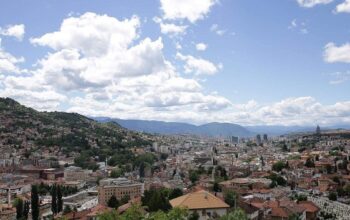It is a strategy as old as democracy itself for a would-be autocrat to justify his claim to extralegal authority by vilifying the country’s squabbling elected leaders. Last week, Sarajevo saw an unusual example of this strategy as High Representative Valentin Inzko turned his statement after the PIC Steering Board Meeting into a populist jeremiad against “a small number of politicians,” i.e., BiH’s top democratically elected leaders.
Amb. Inzko tried repeatedly to delegitimize BiH’s elected leaders by setting them against the citizens who elected them. He said BiH has “failing leaders – not failing citizens” and claimed that “a tiny minority of political leaders have been unable or unwilling to represent the interests of [BiH’s] four million citizens.”
Amb. Inzko even closed his statement with a vague but chilling threat against democratic self-government in BiH: “In the past we have called on political leaders to adopt more constructive and realistic postures; we have worked with them and wherever possible we have supported them. But the results have not been encouraging and citizens, civil society, have to ask themselves whether changes are necessary or not and how long this can continue.”
Amb. Inzko accompanied these attacks and threats against BiH’s elected leaders with an audacious attempt to disclaim OHR’s role in BiH’s dysfunction. Amb. Inzko said, “Given that the policy of the PIC Steering Board, the OHR and the entire international community over the last several years has been to leave decision-making almost entirely with the BiH institutions, attempts at blaming the international community for the country’s problems are simply hollow excuses.”
This is a remarkable claim, especially coming as the Federation and BiH as a whole are still trying to crawl out from the wreckage left by one particular abuse of BiH’s sovereignty by Amb. Inzko. In 2011, in an attempt to disenfranchise Croats in the Federation, the Bosniak SDP and SDA parties formed a new Federation government in flagrant violation of legally established procedures. The BiH Central Election Commission rightly nullified the illegal formation of the new government. But the High Representative quickly responded by handing down an extralegal decree that discarded the Central Election Commission’s decision and effectively imposed the illegally formed government on the Federation.
Amb. Inzko’s decree is widely considered to have been an attack on the rule of law with calamitous effects on BiH politics. The International Crisis Group said the decree “undermined state bodies and the rule of law.” The two largest Croat parties called the decree “the destruction of constitutional order.” Even Bosniak parties blasted the decree, one saying it “egregiously violated the principle of legality and legitimacy of the institutions of the state.” Croatia-based newspaper Večernji List said Amb. Inzko’s decree “led to the biggest crisis since the signing of the Dayton Agreement.”
Two years after the decree, the Federation Government’s illegality and extreme dysfunction—and its junior partners’ all-out resistance to a reshuffling—continue to poison politics at the Federation and BiH levels. It is galling for Amb. Inzko to disclaim all responsibility for the predicament of BiH politics when he did more than any single person to bring it about.
Amb. Inzko’s attempt to deny OHR’s role in BiH’s dysfunction also ignores the role OHR played in creating many of BiH’s dysfunctional institutions. For example, BiH’s deeply unsatisfactory court and prosecutorial systems are OHR inventions that were foisted upon BiH.
More importantly, Amb. Inzko’s denial of OHR’s responsibility ignores the fact that the looming threat of extralegal OHR decrees severely undermines the spirit of give-and-take that is essential to progress in any democracy—and particularly a multinational state like BiH. The presence of a High Representative who claims autocratic powers encourages parties to adopt maximalist positions in hopes of enlisting his help, whether through formal decrees, pressure, or other forms of interference. Instead of doing the hard work of negotiation and compromise, some parties often appeal to Amb. Inzko to unlawfully dictate a “solution.” Conditioning OHR’s closure on the achievement of the so-called 5+2 conditions compounds these perverse effects by giving the High Representative’s favored parties a vested interest in ensuring that the conditions are not fulfilled. Amb. Inzko’s renewed threats to interfere directly in BiH’s governance only exacerbate the distorting effect OHR has on BiH’s politics.
Amb. Inzko appears anxious to declare self-rule in BiH a failure, but, of course it has never really been tried. Since 1998, every high representative, including Amb. Inzko, has disregarded BiH’s sovereignty and constitutional institutions to decree laws, amend constitutions, remove elected leaders from office, centralize power in Sarajevo, punish individuals without due process, and nullify lawful decisions. When the BiH Constitutional Court unanimously found a human rights violation in the lack of a remedy for the High Representative’s extrajudicial punishments, the High Representative immediately issued a decree nullifying the court’s “final and binding” decision and forbidding any proceeding that “challenges or takes issue in any way whatsoever with one or more decisions of the High Representative.” Amb. Inzko, throughout his tenure, has maintained the legally preposterous claim that Annex 10 of the Dayton Accords bestows upon him autocratic powers to rule and punish by unilateral decree.
The international community should reject Amb. Inzko’s extralegal threats against BiH’s democratic institutions and acknowledge that OHR’s leading role in creating BiH’s political dysfunction. For BiH to be truly self governed, the High Representative’s claim to autocratic powers needs to end once and for all.


